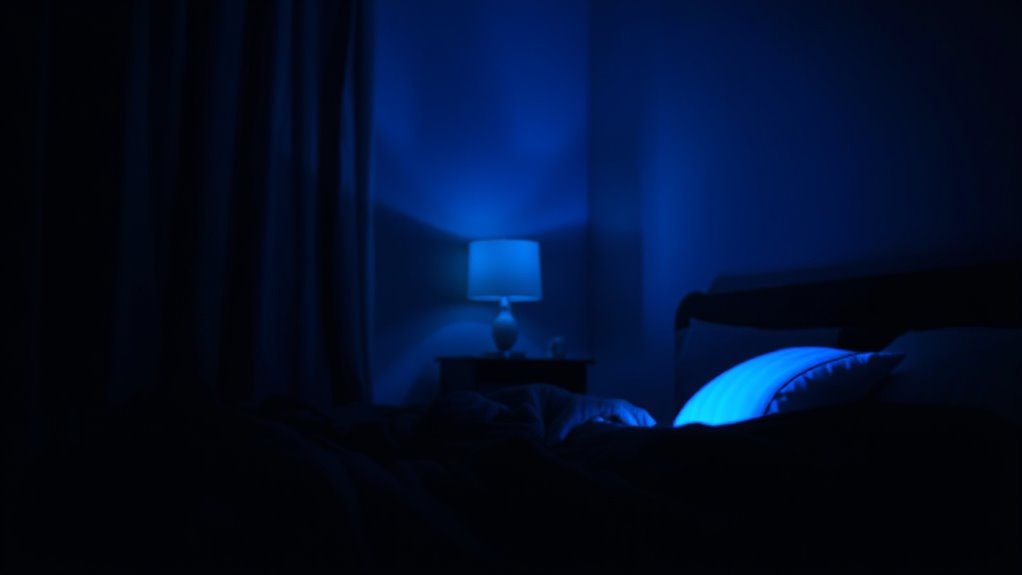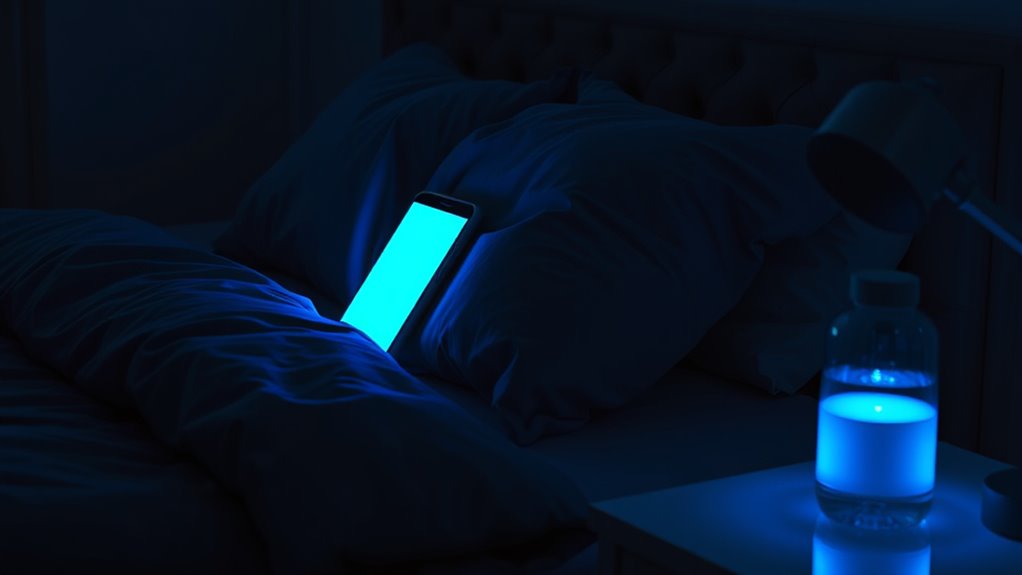Blue light at night interferes with your body’s hormones by suppressing melatonin, making it harder to fall asleep and disrupting your natural circadian rhythm. This can lead to poor sleep quality, tiredness, and long-term health issues like weight gain and immune problems. To block blue light, try using blue light filters or glasses, enabling night mode, and creating relaxing, screen-free bedtime routines. Keep exploring to learn more effective strategies for protecting your sleep and health.
Key Takeaways
- Blue light suppresses melatonin production, delaying sleep onset and disrupting circadian rhythms.
- Exposure at night alters hormonal balance, causing daytime fatigue and potential long-term health issues.
- Using blue light filters, night mode, or blue light glasses reduces exposure and supports natural sleep cycles.
- Creating screen-free bedtime routines helps minimize blue light’s impact on sleep and hormone regulation.
- Managing evening screen time promotes better sleep quality, hormonal balance, and overall well-being.

Many of us spend evenings glued to screens, but the blue light emitted by phones, tablets, and computers can disrupt your sleep cycle. This blue light interferes with your body’s natural rhythms, leading to sleep disruption and making it harder for you to fall asleep or stay asleep through the night. The main culprit is melatonin, a hormone your body produces to signal that it’s time to sleep. When you’re exposed to blue light late in the evening, it suppresses melatonin production, tricking your brain into thinking it’s still daytime. As a result, your sleep becomes fragmented, less restorative, and you may wake up feeling tired even after a full night’s rest.
Blue light from screens disrupts sleep by suppressing melatonin, making it harder to fall asleep and stay rested.
Melatonin suppression doesn’t just delay sleep onset; it can also alter your circadian rhythm, throwing off your internal clock. This disruption can cause you to feel groggy during the day and make it more difficult to wake up refreshed. Over time, consistent exposure to blue light at night can lead to chronic sleep issues, affecting your overall health, mood, and cognitive function. The suppression of melatonin also impacts other hormones involved in your metabolism and immune response, which can contribute to long-term health problems like weight gain or increased vulnerability to illness. Additionally, emerging research suggests that blue light exposure may influence AI Security vulnerabilities related to digital devices, highlighting the importance of managing screen time for overall well-being. Implementing blue light filters can significantly reduce these effects and support healthier sleep patterns.
The good news is that you can take simple steps to protect yourself from blue light’s negative effects. First, try to limit screen time in the hour before bed. Turning off devices or switching to print books can help your body naturally produce melatonin. If you must use screens, consider using blue light filters or glasses that block blue wavelengths. Many smartphones and computers now come with built-in night modes, which reduce blue light emission during evening hours. Additionally, creating a relaxing bedtime routine that doesn’t involve screens can signal to your body that it’s time to wind down. Dimming the lights in your bedroom and keeping electronic devices out of reach can further reinforce your sleep cues. Incorporating protective styling techniques, such as wearing blue light glasses, can also help minimize exposure.
Understanding how blue light impacts your hormones, especially through melatonin suppression, empowers you to make smarter choices for your sleep health. By reducing blue light exposure in the evening, you help restore your natural sleep cycle, leading to better rest and improved overall well-being. Small changes can have a significant impact, so start implementing these habits tonight and give your body the chance to reset its internal clock.
Frequently Asked Questions
Does Blue Light Exposure Affect Children’S Development Differently?
You might wonder if blue light exposure affects children’s development differently. It’s true that children have higher blue light sensitivity, which can impact their child development more markedly. Excessive exposure at night can disrupt sleep patterns, leading to hormonal imbalances that hinder growth and cognitive progress. To protect your child’s development, limit screen time, especially before bed, and encourage activities that reduce blue light exposure, supporting healthier growth and development.
Can Blue Light Exposure Improve Alertness During Night Shifts?
Ever wonder if blue light can boost your alertness during night shifts? It can, by promoting circadian alignment and enhancing alertness. Blue light exposure in the evening can help reset your internal clock, making you more awake and focused. Just be mindful—too much can disrupt your hormones. Use blue light strategically to improve alertness without compromising your sleep quality, and you’ll perform better during those long night hours.
Are There Any Long-Term Health Risks From Blue Light Exposure at Night?
You might wonder if blue light at night poses long-term health risks. Prolonged exposure can lead to circadian disruption, affecting your sleep cycle and hormone balance. Research suggests this disruption could increase your cancer risk over time. To protect yourself, consider limiting screen time before bed, using blue light filters, or wearing glasses that block blue light, helping maintain your circadian rhythm and reduce potential health risks.
How Does Blue Light Impact Melatonin Production in Seniors?
You may notice that blue light impacts melatonin production in seniors by causing retinal damage and circadian disruption. When exposed to blue light at night, your eyes struggle to generate enough melatonin, making it harder to fall asleep. Over time, this disruption can affect overall health. To protect yourself, limit blue light exposure before bed, use blue light filters, and guarantee good sleep hygiene to support your circadian rhythm.
Can Blue Light Blocking Glasses Be Effective During Daytime?
Imagine you’re working late on your laptop, and blue light glasses help you focus better. During daytime, blue light blocking glasses can boost your productivity by reducing eye strain and glare, especially if you spend hours in front of screens. They help protect your eyes from fatigue, making it easier to concentrate. So, yes, wearing them during the day can be effective for eye strain prevention and enhancing your focus.
Conclusion
To protect your sleep, to balance your hormones, and to improve your overall health, you need to limit blue light exposure at night. Turn off screens, use blue light filters, and create a calming bedtime routine. Prioritize darkness, prioritize rest, and prioritize your well-being. Because when you control your environment, you control your health. When you minimize blue light, you maximize your chances for restful sleep, vibrant hormones, and a healthier, happier you.










